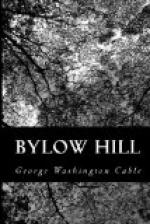There lived, it would be added, his younger brother, so rapidly coming into note,—the eccentric but gifted rector of All Angels; whose great success in the heart of a Congregational community was due hardly more to his high talents than to the combined winsomeness and practical sympathies of his beautiful bride, or to the resourceful wisdom and zeal of his churchwarden, Leonard Byington.
“Any relation to Byington, your new political leader in these parts?”
“Same man,” the answer would be, and there the narrator was sure to fall into a glowing tribute to the ideal companionship existing between the rector, his bride, the young district attorney, and Ruth Byington.
What made this intimacy the more interesting was, in the eyes of a growing number of observers, that, as they said, “Arthur Winslow was not always an affable man, and was much more rarely a happy one.”
Behind and above this popular verdict was that of the old street behind and above the town,—a sort of revised version, a higher criticism. If the young rector, this old street explained, oftener looked anxious than complacent, so in their time, most likely, did St. Paul and St. Peter. If he was not always affable, why, neither are volcanoes; the man was all molten metal within. Anyhow, he filled his church to the doors.
Coaching parties of the vastly rich made the town their Sunday stopping place purely to hear him; not so much because the boldness of his speculations kept his bishop frightened as because he always fused those speculations on, white-hot, to the daily issues of private and public life, in a way to make pampered ladies hold their breath, and men of the world their brows. Such a man, to whom the least sin seemed black and bottomless, yet who appeared to know by experience the soul’s every throe in the foulest crimes, was not going to show his joys on the surface in quips and smiles.
“You should have heard,” said the old street, “his sermon to husbands and wives! His own bride turned pale. He turned pale himself.”
It was wonder enough that even the bride could be happy, at such an altitude, so to speak; immersing herself utterly, as she did, in the interests that devoured him. All Angels forgot his gloom in the radiance of her charms,—the sweet genuineness of her formal pieties, the tender glow and universality of her sympathies, the witchery of her ever ready, never too ready playfulness. It was captivating to see how instantly and entirely she had fitted herself into a partnership so exacting; though it was pitiful to note, on second glance, how the tint and contour of her cheek were losing their perfection, and her eyes were showing those rapid alternations of languor and vivacity which story-tellers call a “hunted look.” Yet, oh, yes, she was happy; the pair were happy. It was as a pair that they were happiest. Else, said the old street, they could not keep up the old Winslow-Byington alliance so beautifully.




